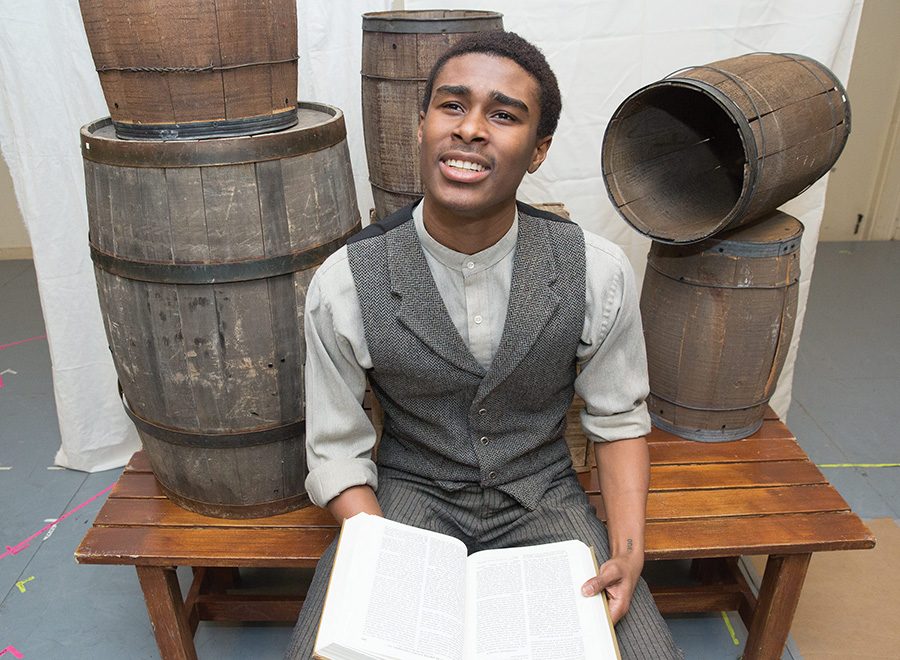Children of history tackle sensitive time period
Playhouse debuts “Uncle Tom’s Cabin” in final show of season
April 4, 2017
Harriet Beecher Stowe’s novel “Uncle Tom’s Cabin,” written in 1852, is an anti-slavery story that follows the life of a middle-aged slave, Tom. The adaptation of this novel by Jason Jacobs and Tome Cousin will be presented on the Rauh stage at the Pittsburgh Playhouse to finish out the 2016-17 Conservatory Theatre Company season.
Jacobs and Cousin’s adaptation includes modern concepts that were not before possible until now. Members of the cast have been immensely affected by this performance and the cultural meaning to their history.
Senior musical theatre major Tony Lorrich II, who plays Adolf in “Uncle Tom’s Cabin,” has been personally affected by the topics in the show and feels a distinct connection to it.
“My last name is Lorrich, which is a combination of my grandparents’ names: Lorraine and Richard,” Lorrich said. “My dad changed my last name from Wallace to Lorrich because Wallace was a slave name.”
“It’s a very different look at slavery and at the roles of slaves in white households,” Lorrich said.
Lorrich said that this show has connected him to his roots, ancestry and past in a way that he has never explored as an actor, giving him a better connection with himself and with the characters he is portraying.
Jacobs, co-director and co-author with Cousin, said the negative baggage attached to the play is what interested himself and Cousin to create their own adaptation. They met together to explore the genre and became interested in 19th century history.
The two chose “Uncle Tom’s Cabin” because of what it says about slavery and dealing with pressure.
Jacobs said he was determined to erase the racial stereotypes that exist. The term “Uncle Tom” has become a racial slur. Jacobs and Cousin adapted the story with the intentions of reversing the negative connotations. They believe that the real Uncle Tom is an admirable hero.
“Society has developed its own definition of the term ‘Uncle Tom,’” said Lamont Walker II, a senior musical theater major who plays Tom in the show. “Our show really gets to the heart of where that term came from and what it actually means.”
Jacobs said the play is a particularly risky show to perform because it is so misunderstood and peoples’ misconceptions may keep them from seeing the show for what it is.
Walker said this show has taken a toll on him during the process because of the sensitivity of the material presented.
“I’ve never been in a production where I’ve had to play something so historically accurate to my cultural history,” Walker said. “To play a slave on stage, although a powerful slave, is still something that affects me more than anything else I could possibly play.”
Jacobs believes the challenging aspects of this show are the most important to the student actors.
“Great art is always uncomfortable,” Jacobs said.
Jacobs said that the students he works with are talented, professional actors that are serious about working hard.
“I can treat them like professional actors,” Jacobs said.
While “Uncle Tom’s Cabin” is not a musical and was not cast with music as a priority, there is music underlying almost the entire show. The directors were impressed that the cast all ended up being amazing singers and are using their talents and instrumental knowledge to their advantage. The music in the show is made up of all original pieces composed by the show’s music director, Doug Levine.
The show opens in the Rauh Theatre at the Pittsburgh Playhouse on April 7 and will run until April 16. There will be a preview on April 6. Tickets for non-students range from $10-$24 and can be purchased at the Playhouse’s box office at 222 Craft Ave. or by calling at (412)-392-8000.


















